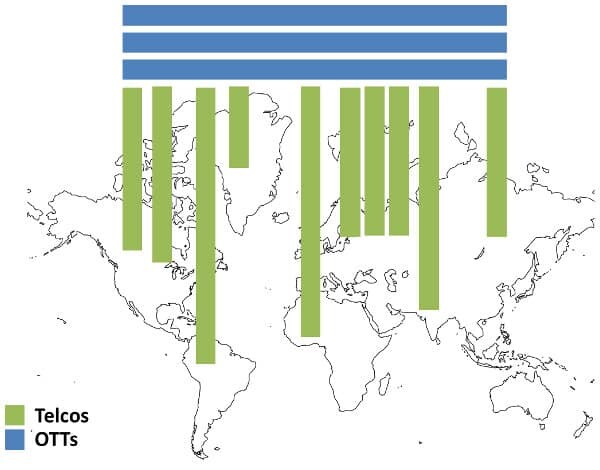Vertical vs. Horizontal.

If you look at the current state of affair, it seems like there is an uneven match going on. On one side of the ring, service providers have huge piles of cash and are making revenue from their customer base; and on the other side of the ring, OTT players just can’t seem to stop the flow of interactions from their users base – a users base that one did these interactions over the service provider.
While there are much to be said about the difference in culture, in size, in support of legacy – and how these stifle the ability of service providers to move fast enough – to innovate at the speed of progress when it comes to communication services; I’d say that even if they do, there still is this nagging problem: they don’t compete evenly – Telcos and OTTs.
The Telco? That’s a regional player. It operates at a given country or territory. It can be spread across countries, but that’s mostly for show – each country will usually operate as its own entity. The biggest ones have 100 million subscribers or so in their database.
The OTT, on the other hand, is a virtual entity – one that acts on a global scale. A few of them have over 100 million users – even a billion if you view Facebook as an OTT. A totally different scale than Telcos. On the other hand, they lack the network – the access points of interactions.
–
In the distant past, the silk road was a set of routes that connected China to the Mediterranean. It was used to pass goods along that way. Traversing through my small country of Israel, many wars were fought over the many cities and forts along these routes.
The Telcos and the OTTs both hold the trade routes of modern times:
- The Telcos hold the connection to the internet – the access to our digital world
- The OTTs hold the human connection on top of the internet – the interactions we make
Telcos and OTTs speak a vastly different language and have vastly different goals and jobs to be done.
Should they compete? Should they partner and cooperate?
Can one succeed and flourish in the domain of the other?

For customers, it sometimes is just as simple as price.
In my country, SMS prices are one of the highest in the world. So an OTT player, which was free, took a large part of that messaging market. Now the telcos have to transport even more bits.
Why did the telcos do this ? And why hasn’t pricing of SMS changed ? Or is this a way for the telcos to get more people to get a data-plan ? Maybe the data-plan bits are actually more expensive than SMS ? I haven’t done the math yet, they probably are on an individual level, but they are part of a larger data-plan used for other bits.
It seems pricing is now slowly changing though, with more and more combined packages. I also see more quadruple play, now. I guess this very much depends on the country your in.
Its a good analogy, its very difficult knowing how they should co-exist. It seems who ever owns the user really show the value.
Owning the user comes in different shapes and sizes. Both the one providing access to the data and the one taking care of the communication interactions “own” the user in some way.